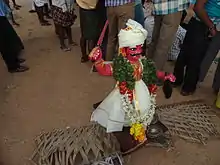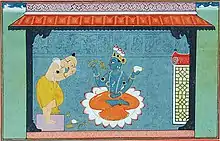| Potu Raju | |
|---|---|
 Figurine of Potu Raju | |
| Affiliation | Vaishnavism |
| Region | South India |
| Personal information | |
| Siblings | Yellamma |
| Consort | Kamavalli |
Potu Raju (Telugu: పోతరాజు, romanized: Pōtu Rāju) is a Hindu folk deity, regarded as a form of Vishnu by his adherents. He is considered to be a gramadevata in some rural regions of Maharashtra and South India, and sometimes considered to be the brother of a female folk deity, such Gangamma and Yellama.[1]
Legend
There are a number of varying legends and stories about the origin and the purpose of the deity, but he is generally regarded as the protector of the shakti of goddesses in their temples and processions, and is celebrated in the Bonalu festival.[2]
In Andhra Pradesh and Telangana, women from agrarian communities revere a pantheon of Sapta Kanyakas, the seven virgin goddesses: Poleramma, Ankamma, Mutyalamma, Pochamma, Bangaramma, Maramma, and Yellamma, whose only brother is regarded to be Potu Raju.[3] He is considered to be the embodiment of the eldest sister, Pochamma.[4]
It is traditionally believed that once, Lakshmi, as Sita, was bewitched by the sight of Rama, and wished to sport with him in the forest. When Rama refused, she cursed him that in his next life, he would spend his next life surrounded by wicked men, and he, in turn, genially told her that she would be born as a mortal in her next life as Kameshvari (Kamavalli), and always smile at the sound of his name. Upon her request, Shiva placed the shakti of Lakshmi in a pool, from which Parvati inadvertently subsequently took seven gulps of, creating the seven sister-goddesses. Since the divine couple could not decide upon adopting them, Potu Raju was born to protect the sisters.[5] When Brahma creates a pair of three sisters from the pool to also guard the goddesses, Potu Raju takes one of them, Kamavalli, as his wife.
In Tamil Nadu, he is considered by some rural communities to be the younger brother of Muniandi.[6]
References
- ↑ Veda, Gunjan (2020-02-24). The Museum of Broken Tea Cups: Postcards from India's Margins. SAGE Publishing India. p. 207. ISBN 978-93-5388-340-9.
- ↑ "bonalu celebrations in twin cities". 2019-07-14. Archived from the original on 2019-07-14. Retrieved 2022-09-25.
- ↑ Singh, K. S. (1992). People of India: Andhra Pradesh. Anthropological Survey of India. p. 2073. ISBN 978-81-7671-006-0.
- ↑ Hatcher, Brian A. (2015-10-05). Hinduism in the Modern World. Routledge. ISBN 978-1-135-04630-9.
- ↑ "'అమ్మ దేవతల' తమ్ముడు మన పోతురాజు". 2019-07-14. Archived from the original on 2019-07-14. Retrieved 2022-09-25.
- ↑ Splendours of Tamil Nadu. Humanities Press. 1982. p. 34. ISBN 978-0-391-02524-0.
| Part of a series on |
| Vaishnavism |
|---|
 |